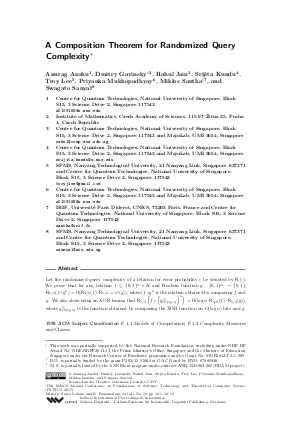A Composition Theorem for Randomized Query Complexity
Authors Anurag Anshu, Dmitry Gavinsky, Rahul Jain, Srijita Kundu, Troy Lee, Priyanka Mukhopadhyay, Miklos Santha, Swagato Sanyal
-
Part of:
Volume:
37th IARCS Annual Conference on Foundations of Software Technology and Theoretical Computer Science (FSTTCS 2017)
Part of: Series: Leibniz International Proceedings in Informatics (LIPIcs)
Part of: Conference: IARCS Annual Conference on Foundations of Software Technology and Theoretical Computer Science (FSTTCS) - License:
 Creative Commons Attribution 3.0 Unported license
Creative Commons Attribution 3.0 Unported license
- Publication Date: 2018-02-12
File

PDF
LIPIcs.FSTTCS.2017.10.pdf
- Filesize: 0.52 MB
- 13 pages
Document Identifiers
Subject Classification
Keywords
- Query algorithms and complexity
- Decision trees
- Composition theorem
- XOR lemma
- Hardness amplification
Metrics
- Access Statistics
-
Total Accesses (updated on a weekly basis)
0PDF Downloads0Metadata Views
Abstract
Let the randomized query complexity of a relation for error probability epsilon be denoted by R_epsilon(). We prove that for any relation f contained in {0,1}^n times R and Boolean function g:{0,1}^m -> {0,1}, R_{1/3}(f o g^n) = Omega(R_{4/9}(f).R_{1/2-1/n^4}(g)), where f o g^n is the relation obtained by composing f and g. We also show using an XOR lemma that R_{1/3}(f o (g^{xor}_{O(log n)})^n) = Omega(log n . R_{4/9}(f) . R_{1/3}(g))$, where g^{xor}_{O(log n)} is the function obtained by composing the XOR function on O(log n) bits and g.
Cite As Get BibTex
Anurag Anshu, Dmitry Gavinsky, Rahul Jain, Srijita Kundu, Troy Lee, Priyanka Mukhopadhyay, Miklos Santha, and Swagato Sanyal. A Composition Theorem for Randomized Query Complexity. In 37th IARCS Annual Conference on Foundations of Software Technology and Theoretical Computer Science (FSTTCS 2017). Leibniz International Proceedings in Informatics (LIPIcs), Volume 93, pp. 10:1-10:13, Schloss Dagstuhl – Leibniz-Zentrum für Informatik (2018)
https://doi.org/10.4230/LIPIcs.FSTTCS.2017.10
BibTex
@InProceedings{anshu_et_al:LIPIcs.FSTTCS.2017.10,
author = {Anshu, Anurag and Gavinsky, Dmitry and Jain, Rahul and Kundu, Srijita and Lee, Troy and Mukhopadhyay, Priyanka and Santha, Miklos and Sanyal, Swagato},
title = {{A Composition Theorem for Randomized Query Complexity}},
booktitle = {37th IARCS Annual Conference on Foundations of Software Technology and Theoretical Computer Science (FSTTCS 2017)},
pages = {10:1--10:13},
series = {Leibniz International Proceedings in Informatics (LIPIcs)},
ISBN = {978-3-95977-055-2},
ISSN = {1868-8969},
year = {2018},
volume = {93},
editor = {Lokam, Satya and Ramanujam, R.},
publisher = {Schloss Dagstuhl -- Leibniz-Zentrum f{\"u}r Informatik},
address = {Dagstuhl, Germany},
URL = {https://drops.dagstuhl.de/entities/document/10.4230/LIPIcs.FSTTCS.2017.10},
URN = {urn:nbn:de:0030-drops-83967},
doi = {10.4230/LIPIcs.FSTTCS.2017.10},
annote = {Keywords: Query algorithms and complexity, Decision trees, Composition theorem, XOR lemma, Hardness amplification}
}
Author Details
References
-
Shalev Ben-David and Robin Kothari. Randomized query complexity of sabotaged and composed functions. In 43rd International Colloquium on Automata, Languages, and Programming, ICALP 2016, July 11-15, 2016, Rome, Italy, pages 60:1-60:14, 2016.

-
Harry Buhrman and Ronald de Wolf. Complexity measures and decision tree complexity: a survey. Theor. Comput. Sci., 288(1):21-43, 2002.

-
Mark Bun and Justin Thaler. Dual lower bounds for approximate degree and Markov-Bernstein inequalities. In Automata, Languages, and Programming - 40th International Colloquium, ICALP 2013, Riga, Latvia, July 8-12, 2013, Proceedings, Part I, pages 303-314, 2013.

-
Arkadev Chattopadhyay, Michal Koucký, Bruno Loff, and Sagnik Mukhopadhyay. Simulation theorems via pseudorandom properties. CoRR, abs/1704.06807, 2017.

-
Andrew Drucker. Improved direct product theorems for randomized query complexity. In Proceedings of the 26th Annual IEEE Conference on Computational Complexity, CCC 2011, San Jose, California, June 8-10, 2011, pages 1-11, 2011.

-
Mika Göös and T. S. Jayram. A composition theorem for conical juntas. In 31st Conference on Computational Complexity, CCC 2016, May 29 to June 1, 2016, Tokyo, Japan, pages 5:1-5:16, 2016.

-
Mika Göös, Toniann Pitassi, and Thomas Watson. Deterministic communication vs. partition number. In IEEE 56th Annual Symposium on Foundations of Computer Science, FOCS 2015, Berkeley, CA, USA, 17-20 October, 2015, pages 1077-1088, 2015.

-
Mika Göös, Toniann Pitassi, and Thomas Watson. Query-to-communication lifting for BPP. CoRR, abs/1703.07666, 2017.

-
Hamed Hatami, Kaave Hosseini, and Shachar Lovett. Structure of protocols for XOR functions. In IEEE 57th Annual Symposium on Foundations of Computer Science, FOCS 2016, 9-11 October 2016, Hyatt Regency, New Brunswick, New Jersey, USA, pages 282-288, 2016.

-
Raghav Kulkarni and Avishay Tal. On fractional block sensitivity. Chicago J. Theor. Comput. Sci., 2016, 2016.

-
Ashley Montanaro. A composition theorem for decision tree complexity. Chicago J. Theor. Comput. Sci., 2014, 2014.

-
Noam Nisan and Avi Wigderson. On rank vs. communication complexity. In 35th Annual Symposium on Foundations of Computer Science, Santa Fe, New Mexico, USA, 20-22 November 1994, pages 831-836, 1994.

-
Ryan O'Donnell, John Wright, Yu Zhao, Xiaorui Sun, and Li-Yang Tan. A composition theorem for parity kill number. In IEEE 29th Conference on Computational Complexity, CCC 2014, Vancouver, BC, Canada, June 11-13, 2014, pages 144-154, 2014.

-
Alexander A. Sherstov. Approximating the AND-OR tree. Theory of Computing, 9:653-663, 2013.

-
Avishay Tal. Properties and applications of boolean function composition. In Innovations in Theoretical Computer Science, ITCS '13, Berkeley, CA, USA, January 9-12, 2013, pages 441-454, 2013.

